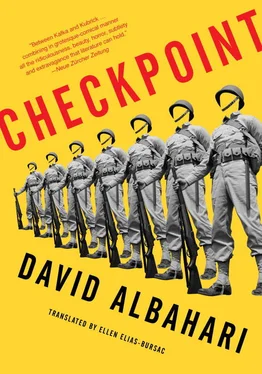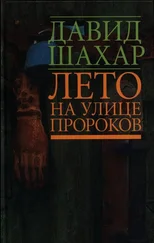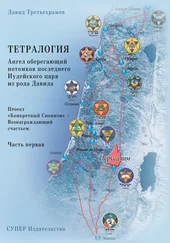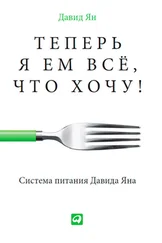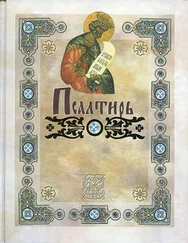behind the soldiers, fused to their heels. When the soldiers returned, the shadows were still swinging from their heels, but with none of the earlier joy. In a word, the shadows on that brief journey downhill and uphill aged quickly, perhaps a little too quickly. Anyone would have aged who’d seen what the shadows saw; it’s enough to say they became darker, more somber, more hermetically sealed. Who knows what they might have said if only they’d had skill with words. As it was, wordless, they were as mute as the soldiers were who, when the “punitive expedition” was over, returned to the checkpoint. The soldiers had completed the task as they were ordered to, meaning that when they entered the “refugee camp,” first they shot at whoever they thought might be the suspicious element, but the deeper in they went, the more suspicious elements there seemed to be, because—as one of the soldiers put it—“not a single person, no child, no one smiled at us with either lips or eyes; their eyes flashed only scorn, a horrible feeling for us because we were there, after all, to protect them, we were promoting their well-being.” Was this why the military weaponry was silent only when they were reloading? Or was it tricky for them to choose between several equally attractive and potentially menacing targets, such as, say, a young woman slipping her hand into her bodice to offer a breast to the baby in her lap when she might, after all, have been reaching for a hand grenade, or a young man opening a cardboard box with toiletries while searching for hand lotion, who might have been about to do the same. At such moments they had to react in a fraction of a second and, regrettably, errors were possible. The commander wrote almost these very words in his letter addressed to the organizational committee of refugees, refusing to speak with the lady translator who was howling hysterically, cursing, threatening and repeating, parrot-like: “To kill so many innocent people for just one murdered soldier! Scandalous!” To this the commander said: “Well, maybe so, but still our suffering and pain matter every bit as much as yours. You cannot insist that we respect your tears while you don’t blink at ours. And besides, we aren’t the reason you left your hearth and home, is that much, at least, clear?” Not even the commander had an answer for that, not only because he didn’t know where they’d come from, but because his every mode of communicating with headquarters and his senior officers was down. The war might be over, but then again it might be ratcheting up, which could easily lead to new alliances, with yesterday’s foes becoming, overnight, today’s friends. In other words, maybe we shouldn’t have been doing what we were doing, maybe the barrier should have been dismantled and passage opened to everyone; or was it just as likely that the barrier would be overgrown with ivy and other vines and never raised again? A wiseguy would say that the real barriers are the ones within us, and that the external ones, like the checkpoint, are, in fact, futile.
Mumonkan , an ancient collection of Zen tales, speaks of all this with eloquence, but no one among us soldiers had Buddhist texts in mind, especially none of the amateur soldiers, society’s dregs, who were generally blasé about warfare. Professional soldiers, like samurai, are another story, and among them one may find connoisseurs of the
Mumonkan and
Hagakure , even lovers of the poetry of T. S. Eliot and the music of Edvard Grieg. Yes, it is one thing to be a samurai and altogether different to be an ordinary recruit who, when he opens his eyes in the morning, cares not a whit for himself or for the world. Meanwhile, the sobs and wails welling up from below, increasingly heart-wrenching as the day went on, forced the commander to ask himself, seriously, what to do about the mob of refugees, because, with their actions and, presumably, primitive mourning customs, they were eroding the morale of his soldiers. But he didn’t dare forget that seven, if not more, soldiers had already been plucked forever from their ranks, and this was a serious threat to the combat readiness of the unit and our ability to complete the tasks assigned us. By then our numbers had dwindled from the initial thirty-seven to a scant thirty, so duty shifts would be longer and each soldier would have more tasks and greater burdens, but the only thing the commander could say was to urge us to visit the little graveyard from time to time, halfway between the checkpoint and the latrine, to listen to what their late fellow fighters, now the young dead, had to say. And sure enough, when we went to the graveyard it was as if we were stepping into another world. Nothing separated the graves from us—we’d been thinking to put up a fence but there hadn’t yet been time; we did install a gate, and everyone who came to the graveyard, despite, as we said, the absence of a fence, always stepped in through the gate. The final gate, as the soldiers so fittingly called it, but in an informal conversation with the commander they made the point of saying we might add an exit gate on the other side, so whoever was leaving the graveyard, whether alive or a ghost, could use it. The commander welcomed the idea, but immediately said in a stern voice that there was no place for ghosts in his unit, nor anywhere else. And then one morning we found a flower planted on each grave. Not a footprint to be seen. Incredible, exclaimed the corporal who was assigned the task of investigating the case, because somebody whose feet never touched the ground must have planted the flowers. So what now? Were we supposed to start believing in angels, and was it even possible to believe in angels if we denied our belief in ghosts? “I will not hear talk,” said the commander, “of such things.” He didn’t care; others could decide according to their own needs and beliefs. At first we tried to establish why each particular flower was chosen: why was a violet planted on the grave of the soldier who’d been hanged, while on the grave of the corporal there was a tulip. On one of the graves there was a cactus, while the flower on another looked a lot like a wallflower, and on the last, a daisy. The cactus, of course, was the oddest choice. If the man who was killed had been, say, a Mexican, well then that could have made sense; was it possible the one who did this—one or more, regardless—had known something about these men the rest of us didn’t know? In the army you only begin to exist when you report for duty and are issued your uniform; everything that comes before that is nobody’s business. Maybe the soldier truly was part Mexican; just as one of us, without anybody knowing, could be Jewish. And if it were found out, what then? The other soldiers would make the man’s life a misery is what. They’d peck at him slowly, the way a chicken snatches and drops a kernel of corn before gulping it down with gusto. And that is how the Jew—hypothetical, or so we hoped—would be snatched and tossed, the difference being that by the end he’d look so bedraggled that no one would care to sniff at him, let alone gulp him down with gusto. The only one who’d fare worse than the poor Jew would be a person who was gay. There are some among us who will tell you a homosexual is the meanest category of human, a degenerate, an incurable lowlife, there’s no second chance for him, something you can always offer a Jew—the chance to convert to another faith—and once the Jew adapts (and Jews do adapt so handily to anything), nothing will stand in his way. Chances are a baptized Jew won’t become the Pope, but a bishop or a cardinal? Well, why not. We were happier believing that among us there were no such persons, and if there were, well that’s a no-brainer—in time they’d give themselves away. Truth is the mightiest weapon, no matter which side we approach it from. But enough about that, we’re at war, and such things are better left unsaid, as tales of homosexuals and Jews have long disturbed us. So let’s skip the cactus; after all maybe it was just a prank by some childish soul desperate to impress his parents, never noticing, meanwhile, that both parents died years before. Wh-wh-when did that happen? stutters the person, unable to mask his chagrin that he had no idea his parents were already dead. Luckily he didn’t blurt something idiotic like: “Why, I was just talking with my father, he says Mother has been under the weather lately.” The commander spreads his hands, says nothing. There are moments when words merely confound. And so, when the delegation of refugees came to the barrier once again, the commander refused, at first, to appear, and then, when the cries of the babies in their mothers’ arms became too heartrending, out he strode, decked in his parade uniform, and, while the eagle feathers on his cap bobbed before their eyes, he declared, staring up at the sky, “With God as my witness.” Rain began falling that very instant and for days afterwards it drizzled. Lucky thing we had no horses: they would not have fared well on such slippery terrain. But should this sudden downpour be understood as affirmation that God exists and was responding? Or was it a spectacular coincidence, as the commander would write in his diary that evening? Meanwhile a new delegation of refugees stepped forward, calm and stalwart, and offered their supplies of meat, sugar, and flour in exchange for beginning the work on their documents of passage. The lady translator was with him again, and she, too, was quiet as a church mouse. “She purrs like a kitten,” said the commander when he took her to his office for, as he put it, a “new round of talks.” The round lasted just over twenty minutes; when the door to the office opened, the translator and commander were grinning from ear to ear. The commander asked where the priest was, meaning the soldier who’d been a student of theology, and we all froze. Was the commander planning to wed? But it turned out he’d promised the refugees our priest would hold a requiem for the people who’d been killed during the punitive expedition. The chanting could be heard for a while, and when he returned, the priest refused to divulge any details; horror was written all over his face. All he’d say was that there were more victims than we’d thought, and that God clearly was not on their side. Someone yelled that he wasn’t on ours, either. “At least he had a glimpse of ours,” answered the priest, “and then he shut his eyes.” Whatever the case, when the refugees returned to the checkpoint the next day, there was nothing left of their gaiety; theirs was a procession of hollow people and the wind blew right through them. First they came up, one by one, to the table set up on their side of the barrier. There sat a soldier whose job it was to check their documents and fill out the form for each one. The information they were asked was the most basic, first and last name, date of birth, citizenship, blood group, medical history, and so forth. The soldier sat while the person giving the information stood because actually there was no better option. The other chair was taken by the woman who was their translator and who, bleary from the sleepless hours of the night before, kept dozing off and waking with a jolt when she’d start translating everything she could hear people saying around her. Once the form was filled, the person would be given a yellow slip with a number and they’d hand it to the next soldier, the one who manned the barrier. This soldier first entered the number into a large book in which on the first and last pages was written, in large print, “Checkpoint Crossings Register” and, in smaller lettering, the heading: “Entries” on the first page and “Exits” on the other. Then the soldier lifted the barrier and waved the people through with all the belongings they were carrying. There was another table beyond this where sat another soldier. He was also filling out a form, an affidavit for the registered person that in the new place, the name of which was not made explicit, he or she would behave in keeping with the local laws and regulations. The soldier entered the first and last name of the person arriving, after which the person signed it. Then the soldier stamped it, scribbled the information in a volume with nothing written on it, and smiled courteously at the now-registered person, who went over to a third table where sat the commander. He, too, smiled, though his smile was more like a grimace and sometimes faded altogether. Then the commander, leaning confidentially toward the person, would say a few words or sentences and hand them a brochure in several languages about the rights and obligations of refugees, published by the United Nations or some other international body, we weren’t sure which. In any case, the commander’s brochure made for attractive reading, because most of them who’d crossed over to the other side, to “our” side (though none of the sides of that hilltop were, technically, ours), sat down on the grass and leafed through it, poring over the commander’s brochure with rapt attention. The commander protested that the brochure wasn’t his, he was merely distributing it, but the moniker stuck, and this only confirmed that popular expressions slip easily into the linguistic corpus of new words or new meanings of old words and there they stay until the next popular new term elbows them out. The day moved on and with it, or rather following it, on moved the refugees who’d been processed. Fortunately there weren’t any clashes except in one case when the soldier filling out the first form bumped into the official translator, and she, probably waking from a happy dream, sent him straight to hell and said she hoped he’d hang from the nearest willow. Lucky thing she didn’t mention an oak or a pear tree; mythic sites like these should not be invoked in just any sentence, and even the mention of the willow was a little iffy, what with all that goes on with willows. A few minutes later the lady translator, as soon as she’d splashed her face with cold water, realized how rude she’d been and hastened to find the soldier, meaning to apologize. But by the time she returned to the table, she saw another man there and heard from him that the first (“your soldier,” the other soldier called him) had finished his shift and probably, said the soldier, had gone off to catch up on his sleep. The lady translator thanked him and headed for the sleeping quarters. If she’d known what awaited her there she probably wouldn’t have gone, but, as she later explained, she thought she’d run into the soldier at the door to the dormitory, rattle off her apology and expression of gratitude, turn around, and go. But the soldier was already there, lying on his cot and masturbating. This is certainly not unusual for soldiers, some of them masturbate several times a day, and group masturbations have been recorded with each soldier jerking off the soldier next to him, sometimes two at a time. It’s harmless fun, masturbating, harmless yet handy, since it eases tension, promotes physical relaxation, and stimulates the appetite. The soldier may not have known any of that, or was perhaps still unaware that she was standing there, or he may have been confused; whichever it was, when he came with a sigh and opened his eyes, he saw an attractive woman smiling down at him. His next move might be startling, but it certainly isn’t difficult to comprehend. He reached out swiftly with his left and grabbed her by the neck, and then, as he drew her to him and pushed her head down, he lifted the blanket with his right and exposed his half-erect penis. Later, when questioned, he did say it hadn’t occurred to him that she might be a genuine flesh-and-blood person—what, after all, would such a beautiful woman been doing in their quarters?—and only when he felt, and we quote, “her velvety lips on the head of my penis,” did he let loose. He pulled her head lower still which apparently so flabbergasted the woman that she fainted and sank to the floor next to the cot. The soldier wasted not a moment. He woke up a soldier who was asleep on the cot next to his and to whom he owed money—the sum in question was not stated—and asked him whether he’d like the debt returned in kind. The other laughed and, we quote, “told him to fuck off” and turned over, hoping to go back to sleep, but then the first soldier explained what he was up to and pointed to the insensate woman lying there on her back, her legs spread as much as her short skirt allowed, but enough so that at the top of her pale thighs they could see a flash of white panties and around them, strands of curly pubic hair. They grabbed her by the hands and feet, swung her up onto the first soldier’s cot, and then, first one, then the other, they shamelessly violated her. Later they claimed the sex was not against her will, that, in fact, she was awake the whole time and loved every minute of it, and as proof they said that during both, and we quote, “fucks,” the woman smiled blissfully and she only started screaming, writhing, punching, and scratching when she realized it was coming to an end. If they’d been able to find a third soldier, said the first two soldiers, the woman, and we quote, “would have gladly gone right on fucking,” which the woman denied as the most appalling accusation she’d ever heard. The commander, to whom they turned immediately afterwards, had no idea at first how to respond, as his mustache leered while the soldiers were telling him how they’d raped her. And besides, hadn’t he been alone with her for a full twenty minutes or more, and hadn’t both of them been grinning when they left the office? Was there a valid question as to whether the commander could be partial as a judge? This is a tricky one. Rape of the civilian population, regardless of age or sex, was punished severely, often by firing squad, but the commander was already undermanned and to give up two more men was a luxury he could not afford. When the translator heard his decision she nearly exploded, but by then the matter was done and dusted, and the commander no longer paid her or any of the remaining refugees any attention. They had all been issued their certificates of refugee status and could move forward. Theoretically speaking, they could have moved backward just as well, but nobody considered this as an option. In war one leaves at a run; it’s only in peacetime that one approaches at a walk, and we are now, as the commander put it, “up to our necks in war shit.” One of the two remaining corporals is supposed to have said: “Shit is shit, there’s no divvying it into war shit and peace shit, because then army asses would be different from civilian ones.” Wise words, no doubt, and they even coaxed a smile from the commander when someone reported them to him, though later when asked, he’d forgotten them. Forgetting is a marvelous defense, one widely known for years, but not everybody knows how to utilize it well. First of all the mind should be in passive, not active mode, in a mode known as standby, like a printer awaiting the print command. Power usage is at a minimum while the device is forever poised for action, something that is especially key if considered from a military vantage point. And does any other vantage point exist for us? From the checkpoint we watched as the refugee column snaked farther and farther away and then pivoted and disappeared into the forest, but unlike the scout squads that had followed the same path and had circled back to us, the refugees never again appeared, a fact that vindicated those who’d been claiming from the start that the forest was enchanted. Those who did not believe in miracles, and there were plenty of them though the number was dwindling, claimed there were many forked paths in the woods, and whoever knew their destination and knew the woods well, as did the refugees and their leaders, would never stray. Their feet would take them, so to speak, wherever they needed to go. Here Mladen chimed in to say that every forest has a thousand faces and the faces can be easily confused, but the claim that he’d lost his way or taken a wrong turn was highly unlikely. He, at least, knew this, he said, since he was born and had spent most of his life in a forest, on a mountainside, so as far as he was concerned, as with Tarzan long ago, the true wilderness was the city, a claustrophobic urban space. The forest was a different story, and he could go on and on about it, but this time he merely wanted to make the point that there are paths and byways in forests that meander, meaning they take some travelers in one direction and other travelers in the opposite or a different direction. While he was saying this, the other soldiers exchanged glances, shrugged, and tapped their temples. Many might say he was crazy, went on Mladen, but he dared each of us to go off into the forest following the same path the refugees had taken and we’d see whether we caught up with them or whether this seemingly meek path would take us to the shore of a lake, and then slam shut behind us and condemn us to a lifetime by the lake, living off fish and blueberries. Those who spoke up before him suddenly rebelled and said he should stop the gibberish; Mladen dismissed them with a wave, he spat and swore, and this caused a groundswell of protests and threats. Who knows what would have happened in the end if they hadn’t heard the roar of a motor and before their eyes appeared a clanking, old military jeep. The jeep clattered up the hill with effort and reached the checkpoint where it stopped, and from it stepped a portly soldier holding a large cloth sack. He strode over to the commander as if he knew him well, handed him the sack, smiled, and, clear as a bell, said—all of us heard it—“Your mail, sir.” Though we’d all heard it, each of us repeated the words and soon our unit was humming like a beehive. It’s difficult to say what kept us from charging the portly soldier and our commander, ripping the sack from his hands, tearing it open, and dumping the letters on the ground. No, we all stood there quietly and pretended the sack interested us not at all, that we weren’t soldiers but, say, beekeepers at an inter-city competition lasting only a day or two where nobody expects to receive mail. So we waited for the portly soldier to exchange sentences with the commander, at least two of which we couldn’t catch, in three we grasped a word or two, while the others were fully comprehensible. Short exclamations (and one quite innocuous swear) didn’t count, such as: “You don’t say!” “Heavens to Betsy!” and “Screw your granny!” The portly soldier sat in the jeep, beeped his horn in farewell, turned the jeep to go back where he’d come from, honked again, revved the motor, and swiftly vanished. For a time the softer and softer hum of the motor could be heard from the forest, and finally that, too, was gone. The commander breathed deeply, took hold of the sack and opened it gingerly as if thinking he might want to use it again. The soldiers in formation were shivering like drug addicts in crisis; their knives, with which they were poised to slice their packages open, kept dropping from their hands. Hearing the clatter of the knives, the commander offered his apologies and even mentioned the tendrils of arthritis that toyed with his fingers and prevented him from being more spry. While he was saying this he drew out the first letter and read the name of the addressee. No one responded and only after the third call did we realize it was for the sentry who’d been found dead in the latrine. “Idiots,” said the commander. “Again they’re shirking their duties!” He was thinking, of course, of the service that was tasked with informing the families of soldiers who’d been killed, and which clearly was not doing its job. If they had, no one would have been writing to the dead boy; the army did not deliver mail to heaven. Or hell, whichever. For those sorts of messages one needs angels or devils, depending on which variety seems preferable. The commander went on retrieving letters and calling the names, the soldiers came up and took them, some with hands trembling, some with lips contorted, two or three sniffling, and one soldier dropping a proper tear on the commander’s hand, the hand that was giving him the letter. For a moment the tear lingered there, then it began to slide, and finally it rolled off and dropped to the ground. The commander had tried to catch it midair but failed. “No point in wasting tears,” he whispered, which might have sounded to somebody like a transmission of secret messages and ancient lore. Then the commander took out two letters and crowed: “This is for me! And this, too!” It was obvious he’d be happiest racing off and settling into a cozy corner and there, in peace and quiet, read both letters. But the army is the army, duty is duty, so all he could do was fold them and tuck them into his pocket. On he went reading out the names and, after the letters, he gave out the larger and smaller parcels, as well as a postal form on which was a message that a parcel that was to be delivered to such and such a soldier had been discarded as it contained forbidden substances. In parentheses there was a handwritten note: “roast lamb, brandy, onions.” We all turned to look at the soldier, each of us with a mournful expression. We’d never recover from the loss, this was clear, but first we needed to discover where the mail sack had come from. No one knew where we were, all lines of communication were down, the equipment wasn’t working, morale was at a record low, and yet our mail was delivered. How could that be? We asked the commander to explain this to us, it was his job, after all, to inform us regularly on the state of affairs in the theater of war and elaborate on things that baffled us. The commander, however, was hopping around impatiently and could barely wait to retreat to his room and read his three letters in seclusion—the third was the last he took out when everybody already thought there were none left in the sack. “Why this mail?” wondered the commander and, bemused, scratched his head. He, of course, had no idea why, but still he tried valiantly to cobble together some sort of explanation. What he came up with held water so poorly, with the water seeping and dribbling out on all sides, that even the most reticent among us began speaking of a flood. Though not yet a flood, the situation completely changed that night when a downpour began that went on for hours, days perhaps, and showed no likelihood of letting up. At first, while thunder rumbled and fat drops of rain splattered on the roof, we all said how the drumming of rain is such a pleasant sound, how nature breathes better afterwards, how much easier we sleep, and how the windows should be opened and fresh air let in. The next morning when we opened our eyes, the rain was still tapping rhythmically on the roof, as if Ginger Baker were a distant cousin. We got up, staggered around among the cots, rubbed our eyes, and conspired to crawl back under the covers. The commander refused to allow it and forced us to do pointless tasks such as picking up bits of litter around the checkpoint barrier. The soldiers who did this came back as drenched as mice. Like the rest of us they had no dry uniforms to change into, and when they stripped off their sopping shirts, jackets, and trousers, they sat there among us half-dressed in their olive-drab skivvies. When he saw this, the commander had an attack of spleen: “What now? Is this a public bath? A soldier in his briefs is not a soldier!” He howled at the top of his lungs, flailed his arms, and portrayed himself, all in all, in an extremely unfavorable light. “But what else could I do?” asked the commander. “Young soldiers are like pups,” he went on, “so you must constantly impress upon them who’s in charge. Well, will you look at that: our commander is true blue!” He liked this wording and over and over he said: “A true blue commander.” In the evening while we were all at work scraping the mud off our boots, he gazed up at the ceiling and whispered: “A true blue commander,” and his face went almost translucent with the soft shine of an inner goodness. But according to the quixotic laws governing the world, good works have less currency than bad, and so it was that the commander’s words were drowned out by a sudden hammering on the roof: hail the size of marbles. The thought of marbles stirred a torrent of memories; the wave of nostalgia threatened to paralyze any activity by the soldiers. Had the weather been more agreeable they’d have all been lying on their backs in the meadow and waxing melancholic about the clouds, the shapes and way they were dispersing, how long they last and whether they can be trusted, both for forecasting meteorological events and future events in the lives of human beings. In other words, will the appearance of a pear-shaped cloud affect our life differently from that of a bird-shaped one? And so forth, as one of the soldiers said, with the obligatory stalk of straw in the teeth. The commander, seeing and hearing all this, was devastated. Had he known, he said, what the soldiers in his unit would be like, he’d never have responded to the summons from headquarters. He’d have stayed happily at home and relaxed, calm and serene, in his tracksuit and slippers. Then he wouldn’t be listening to this folderol about clouds, or straws. Had someone predicted he’d be commanding a pack of nostalgia-ridden soldiers, he’d have sued this person for defamation, and if he’d done that, where’d he be now? By rights he’d be apologizing to the person and returning the money the person had been mandated to pay him after being so instructed by the court, to compensate for his mental anguish, compounded with interest. “The world sucks,” said the commander and kicked a small rock. The rock bounced, knocked the door frame, and rolled out into the damp grass. The rain was still pelting outside, even harder, perhaps, than before, and everything was sinking slowly into mud. Then a soldier whose stomach troubles forced him to venture to the latrine despite the dreadful weather, informed the commander that the latrine was no longer standing; the water and mud had swamped it and swept it down the slope, and the graveyard, too, was beginning to slide, which was easy to see with the lean of the wooden crosses and tilting mounds. Then from deep inside the sleeping quarters rang out a shot and everyone dropped to the floor. “Someone’s killed themselves,” said a soldier, and—though the bullet had carried away almost half his face—we easily recognized that someone as Dragan Chicken Little, the youngest of our number. He hadn’t had the nickname Chicken Little before he joined the army and arrived at the checkpoint. It was maybe our second night there (or third?), when he’d crowed like a rooster in his sleep so loudly that he woke half the company. The next morning, of course, he remembered none of this, but he stubbornly protested that he’d never dreamt of hens: “Chicks, oh yes,” he insisted, “but hens—never!” So that’s how he became Dragan Chicken Little and often, when somebody addressed him, he’d answer with a cockcrow, which, without fail, sent us into gales of laughter. Now his body lay there at the end of the room and blood and chunks of his brain and skull were sprayed across several cots. And the near wall. When they saw this, many soldiers ran outside and vomited for a long time into the mud. The commander was the first to collect his wits; he made his way over to where Chicken Little’s body lay, then stopped, in disbelief, knelt beside him, leaned over, and whispered: “Why, Chicken Little, why?” Blood trickled onto the commander’s right knee and when he rose to his feet we could all see the dark-red stain on his pants. “How are we going to bury him in this weather, with all this mud?” wondered one of the soldiers, and only then did we notice the rain had stopped. The rain stopped, but then something else could be heard, a shrill cry, either animal or human. As always in such situations, there were differences of opinion: some believed it was human but they couldn’t agree on what steps to take. Some called for a rescue team to be sent out while others urged caution and even spoke of a trap. The ones who believed an animal was making the sound showed no great compulsion to go outside, yet there were some among them who said there’s no serious difference between animal and human suffering, and if they’d go outside for a person, they should do it for an animal. Just as a brawl was starting to erupt with shouts of “C’mon! C’mon!” someone out-shouted the ruckus with the question: “And what if the dead are rising from their graves?” In the sudden hush that followed, no one dared even lift their head to look others in the eye. The shrill cry continued, but now there were brief still spells, respites perhaps, as the wounded animal or mutilated woman gasped for breath and stared into the dark, and every rustle signaled the nearing end, the touch of a cold knife or a bullet’s hot steel. That was certainly better than lying there not alive or dead, in the dark, on the wet grass and oozing mud. And who knows what would have happened next had the petrifying cry not fallen silent, followed only by the rustling of leaves in the dark, which always lulls one to sleep, perhaps not as readily as the touch of a beloved hand, but very well indeed, never better, and this may be what the commander was thinking as the soldiers, fully clothed, slumped onto cots and drifted off to sleep. In the end the commander was standing there alone, surrounded by a company of sleepers, and only then did he remember that there was no one manning the sentry post. He tried to jostle one of the corporals awake but the man turned over onto his other side and went right on sleeping. Another corporal, asleep on the next cot over, didn’t move at all. The commander rose to his feet, pulled on his boots, grabbed the first gun he could lay his hands on, and sat down outside by the barrier. Aside from the moon in the sky, nothing was moving as far as he could see. Something rustled at his back, then to his left, then to his right. Had he been in Australia, the commander might have imagined a kangaroo seeking its way in the dark, but here at the checkpoint barrier this could only be a grasshopper. Or a jumping mouse, thought the commander, if there are jumping mice around here. All manner of things are in these parts, but there’s no one at hand to inform us about them; the number of people who have the gift of the gab, let alone storytelling, has shrunk to next to nothing, and this is not only because of the war. The commander, who’d never been compelled by linguistic subjects and dilemmas, dozed off, but then he felt a touch on his back and, lightning fast, clutching his gun, he turned and peered behind him. No one. The last wisps of scattering clouds were drifting off, and, in no time, under the light of the vast moon, the night was nearly as bright as at daybreak. Soon the commander could see the soldier was right: the latrine sheds lay in pieces on the ground. The graves, however, were not in such bad shape, though some of the signs and one of the crosses were indeed listing. The commander saw all this from a safe distance, from the paved road, because on all other surfaces the mud prevented any sort of movement. Then to the east, the sky began to redden and erase the gray nuances of the remaining, thinned darkness. The commander waited a moment longer, just enough for the top of the sun’s orb to appear out of the nest of dawn, and off he strode to the sleeping quarters, banged the iron bars on the soldiers’ cots and woke them up with barking shouts. The soldiers, rolled in blankets like huge worms, opened their eyes reluctantly, some even swore while others flung bits of papers with comments written on them, but soon the commander’s voice soothed them, and in the end the only noise was the gasps of those who still hadn’t finished getting dressed and fumbled at buttoning up their tight trousers or tugging at the elastic band around their neck as they adjusted their tie. The commander ordered them to line up in the narrow passage between the cots, because once they stepped outside the mud wouldn’t allow them back in. Then he clambered up onto a cot, coughed, and said: “Soldiers, I’ll be brief. The moment nears when our stay here will be threatened by a lack of food, and we aren’t much better off with water supplies. All our means of communication have been dead for some time now. We don’t know whether the war is still on, or whether one war might have ended and another begun, just as we don’t know the main thing—who our enemy is—and this places us in a remarkably awkward situation. Because of all this, I’ve decided that as of tomorrow, or perhaps the day after, depending on how long it takes for the mud to dry and form a crust, we pack our things and make our way slowly back. Is that clear?” barked the commander, and from all the soldiers’ throats rang, “Yessir!” “And now,” said the commander in a gentler tone, “let’s each of us see to our tasks.” He climbed clumsily down from the cot and probably would have fallen if the soldiers hadn’t propped him up. He jerked away from them, however, almost angrily, as if his graceless leap was all their doing; he was the first to venture out. The soldiers surged after him though none of them were sure what their tasks were, and they weren’t asking anyone to figure out what they should be doing, but they had nothing to worry about: we are usually assigned tasks by others anyway. While the soldiers were streaming out, crowding around the barrier and stretching in the warm rays of the sun, one of them glanced over at the forest, not the trees nearest to them but the woods on the other side, near where they’d found the tattered scrap of fatigues, and having spotted a flash of something, he saw a sniper in the bushes who was taking aim at them. “Sniper!” shouted the soldier and threw himself to the ground, while at that same moment the soldier standing next to him suddenly sputtered as blood spewed from his gullet in a great gush. Chaos. The soldiers dashed back in and out they flew with weapons, dropping to the ground, into the mud, and firing off their guns in all directions. The commander ran around among them in great agitation, and railed: “Where is he, that little mummyfucker, where’s he hiding?” The sniper wasted not a minute, and, instead, calmly, as if at a firing range, he picked off moving targets. Two more soldiers fell before somebody—no one would ever find out who—hit him. The sniper was, apparently, wired to an explosive device because his stagger and fall set off a thunderous, multiple blast. The earth, leaves, branches, and, probably, bits of the sniper flew through the air. The surrounding underbrush burned where he’d been hiding—well, actually, smoldered. The soldiers rejoiced, they jumped, yelled, and pranced around in a circle like Indians around war drums, but then they heard a rumbling, so they stopped and, bewildered, peered into the facing forest. “Impossible,” said the commander, but the corporal who was standing next to him said: “Oh, of course it’s possible.” Afterwards, once a tank had come crashing through the bushes, no one said another word. In silence they watched the gun barrel shifting on the tank with a slight wobble until it fixed on them. And, as if under a spell, they stood and gawked, and one could almost hear the soundtrack from that science fiction series and the phrase: “Resistance is futile.” “Not so,” whispered the commander, who dropped his weapons, grabbed a helmet, and off he raced into the woods. Meanwhile, without moving its gun barrel, the tank rolled slowly toward the checkpoint. This was one of those light tanks, maybe a British Scorpion, but to the paralyzed soldiers it seemed like the largest armored vehicle they’d ever seen. Then two things happened: first the soldiers caught sight of the commander decked out in green camouflage with twigs on his helmet, slithering through the tall grass, bushes, and mud, making straight for the tank. The soldiers began shouting words of encouragement, which, of course, was all wrong, because the tank crew peered out through various apertures and, apparently, saw the commander; they tried shifting direction but floundered even deeper into the mud. The front part of the tank sank almost to its full height, the gun barrel dangerously close to the ground, and no matter how the caterpillar treads whirred, the tank couldn’t right itself. Nothing could stop the soldiers now, and with boisterous cries they charged the tank. Hearing their shouts, the commander scrambled up, sprinted over to the tank, and then cautiously approached the hatch. The bullet that struck him did not, however, come from there but from the forest where, earlier, the sniper had hidden. The commander reeled but succeeded in twisting so he fell not to the ground but slid by the cupola and remained leaning on the tank. The soldiers who were about to charge abruptly changed the direction they were running in and dropped to the ground. One of them did run up to the tank, shove the barrel of his automatic weapon into an opening, and fire into it in several directions. He withdrew the gun, huffed into it like a cowboy into his pistol, and waited. Nothing moved, no voice was heard, only the commander’s moans reached us like the buzz of a pesky bug. Meanwhile the soldiers who’d flung themselves to the ground squirmed toward the bushes, approaching from all sides and then, simultaneously, like a well-oiled mechanism, strafed them up and down. When they stopped shooting, they crawled slowly, one by one, into the bushes and we held our breath, fearing surprise. Every shrub might be a deadly trap, we learned this in our military training, so we clutched one another’s hands, bit our lips, and shut our eyes. It turned out this wasn’t necessary because the soldiers soon returned with the bodies of the enemy who’d been killed. From the tank we pulled another four, so there were six enemy bodies laid out on the ground by the barrier. The commander, who’d only been grazed by the bullet, rifled through their pockets, bags, and gas masks, but nowhere did he find any indication of their identity, place of residence, marital status, or blood group. One of the corporals said to him that though this might be sheer coincidence, two of the enemy soldiers, the two in the middle, were the spitting image of a neighbor of his and the man’s son: the same chestnut hair, the same scraggly whiskers, the same arched brows. “I cannot believe they could be anybody else,” said the soldier, “but if they are, why are they in cahoots with the enemy? Maybe,” he continued, “they’re actually on our side and thought we were the enemy when they attacked us?” “No,” said the commander, scowling with pain. “Our army has no British tanks.” “Then,” said the soldier, “apparently they joined forces with the enemy.” “They didn’t join forces,” said the commander, “they
Читать дальше
